When he doesn’t preach God’s word, Reverend Joo Ieong-Bong raises slaughter dogs.
However, the job is not going well. In fact, it is on the verge of becoming illegal.
“From last summer we tried to sell our dogs, but traders only blame”, Mr. Joo, 60, says BBC. “No one showed up.”
In 2024. year, the Southern Korean government was a ban on the nation for sales of late meat for consumption. Location Legislation, which has passed last January, gives farmers as Mr. Joo until February 2027. To close their operations and sell their remaining animals.
But many say that there is not enough time to abolish industry that has transferred funds to generations – and that the authorities have not yet been devised for adequate protective measures for farmers or estimated half a million dogs in captivity.
Even those who support the ban, including experts and advocate issues in its implementation – including difficulties with rehoming dogs that were preserved from the flag of killings, now facing the increasingly the threat of euthanasia.
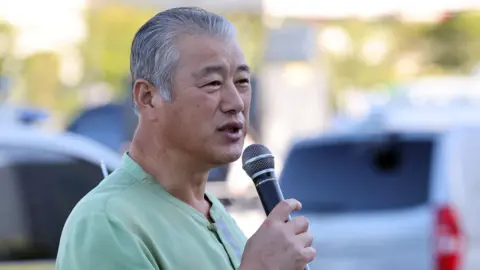 News1
News1Midvai Through Grace Period, dog farmers are with hundreds of practically indisputable animals, farms that cannot close and few funds for putting food on the table.
“People suffer,” says G. Joo, who is also the president of the Korean Association of Edible Dogs, the group presenting the industry. “We’re drowning in debt, I can’t pay him, and some can’t even … find a new work.
“It’s a hopeless situation.”
Storm barrier
Chan-Voo is 18 months to break free 600 dogs.
After that, the 33-year-old meat, – to whom we agreed on an anonymous for fear of backward threshold – faces a penalty to two years in prison.
“Realistically, even only on my farm, I can’t handle the number of dogs I have at the time,” he says. “At this point I have invested all my property [into the farm] – And yet they don’t even take dogs. “
Under “They”, Chan-Voo does not only mean merchants and butchers who bought a average of half of tens of dogs per week before banning.
It also refers to activists and authorities for the rights of animals struggling so hard to ban the meat for dogs, do not have a clear plan for what to deal with animals – about 500,000, according to government estimates.
“They [the authorities] They brought the law without any real plan, and now they say I can’t even take dogs. “
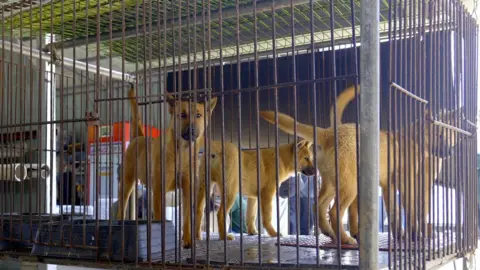 Hyunjung Kim / BBC News
Hyunjung Kim / BBC NewsLee Sangkiung, campaign manager in a human world for animals Korea (HAVK), echoes these problems.
“Although the ban on dogs pass, both the government and civil groups are still facing how to save the remaining dogs,” he says. “One area that still feels missing is a discussion around the dogs behind.”
A spokesman from the Ministry of Agriculture, Food and Rural Jobs said that the BBC said that the farm owners gave their dogs, local governments would take possession and manage them in shelters.
However, the rehoming showed them challenging.
Since the weight is equal to profit in the dog meat industry, farms tend to favor larger breeds. But in very urbanization of South Korea, where many people live in apartments, aspirating pet owners often want the opposite.
There is also a social stigma associated with dogs that come from meat farms, Mr. Lee explains, due to diseases and trauma. The question is additionally complicated by the fact that many are clean or mixed to Tsa, a breed that is classified as “dangerous” in South Korea and requires government approval to keep as a pet.
Meanwhile, rescue shelters are already overpops.
This perfect storm hurdles indicates a perverse irony: it is countless so-called rescue dogs, and nowhere else to deal with, now facing perspective to be euthanized.
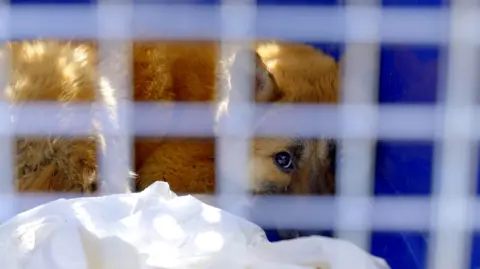 Hyunjung Kim / BBC News
Hyunjung Kim / BBC News“It’s just amazing,” Chan-Voo says.
“Since the law is given according to these groups, I also assumed that they were able to take responsibility for them. But now I hear that even animal rights groups say that the animal rights group is the only option.”
Cho Hee-Kyung, the head of the Korean animal welfare association, associated in September 2024. that it will try to save as many animals as possible, “whether they stopped dogs.”
“If the remaining dogs become” lost and abandoned animals “, then she is heart, but will be euthanized,” she said.
The government later sought to interfere with weeks later, saying that the euthanaring of the animal was “safe” is not part of their plan.
Recently, Mafra told the BBC that he invested about 6 billion Korean ($ 4.3 million) for expanding animal shelters and support for private facilities and offered to 600,000 Korean PSUs ($ 450; £ 324) to farmers who have closed their companies early.
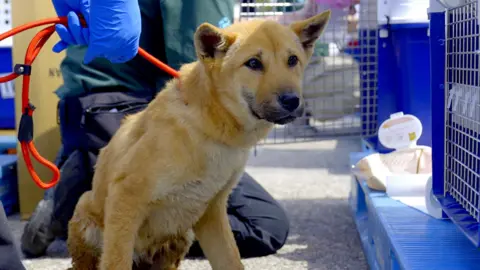 Hyunjung Kim / BBC News
Hyunjung Kim / BBC NewsAli Chun Miung-Sun, director of the Veterinary Education Office at Seoul National University, agrees that a wider government plan for dog residues is largely lacking.
“It is necessary to be a concrete discussion on how to” dispose of “dogs,” she says.
“And the adoption and euthanasia should be on the table. [But] If we went for efforts to save the dogs from cruel slaughter just to euthanise them, it’s understandable that people feel without heart and angry. “
Livelihnost
Some further asked solutions, sending animals abroad abroad in line with articles like Canada, the United Kingdom and the United States.
In 2023. year, Tim Hvak saved about 200 dogs from the farm in Asanian city – all of which since then sent to Canada and the United States.
The former owner of that farm, the 74-year-old Yang Jong-Tae, said BBC that he was watching rescuers loading his dogs in his trucks, are amazed by the level of compassion they showed.
“When I saw how they handled animals – as if they had dealt people, so lightly and kindly,” he really moved me, “he said.
“We’re not treating like that. For us, raising dogs was just a way to earn a living. But those people from the animal group treated dogs as if they were individuals with dignity and it is really a dignity.”
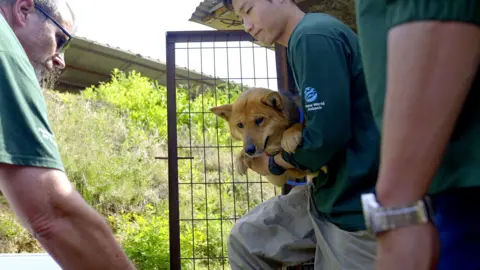 Hiunjung Kim / BBC News
Hiunjung Kim / BBC NewsMr. Yang hurried to add, however, not to approve a ban on agricultural meat.
“If dog meat is forbidden because the dogs are animals, then why is it ok to eat other animals like cows, pigs or chicken?” He said. “It’s the same thing. These things exist in nature that people live on.”
Dog eating is not the same as eating other meat, according to MS Chun. It points out that dog meat bears more risks of food safety and hygiene perspective – especially in South Korea, where not integrated into a formal, regulated meat production system.
And while the spending rates were dialed through the history of Korea, it became more and more taboo in recent years.
Government survey from 2024. Only 8% of respondents said they were tried by dog meat in the previous 12 months – to 27% in 2015 years. About 7% said that would still be eaten until February 2027. years, and about 3.3% stated that about 3.3% would be performed after about 3.3% would have stated that they will fully enter the full effect.
Meanwhile, since June 2025. year, 623. of 1,537 South Korea dogs closed.
“As society and culture developed, South Korea company has now made a decision on the termination of meat production,” says Mrs. Chun.
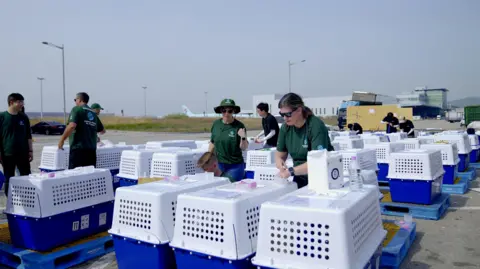 Hiunjung Kim / BBC News
Hiunjung Kim / BBC NewsAnd yet for many, it remains the cornerstone of the industry where they have built their own life.
Each member of the BBC PASA Messa has spoken extremely uncertainty about how they supported now that their long-term funds were considered illegal.
Some say they resigned to the life of poverty, noticing that they were born during the Korean War and they knew they were living hungry. Others suggested that trade can go underground.
However, many agree that for younger farmers that the crack is especially worrying.
“Young people in this industry are really facing dark reality,” says G. Joo. “Since they can’t sell dogs, they can’t turn off quickly. They’re stuck, no way forward or back.”
Chan-Voo remembers that when the decade he started working in the industry before the decade, “the perception of the dog meat was not so negative.”
“Still,” adds, “there were comments from people around me, and even then I was aware that I couldn’t do that for the rest of my life.”
The ban came faster than he expected – and from her announcement, he says, “earning life became incredibly uncertain”.
“Everything now we hope is that the grace period can be extended so that the process is [of dealing with the remaining dogs] It can happen gradually. “
Many others hope the same. But as the dog industry pulled out of the legs of those who came to depend on it, Mr. Joo can’t help but guess at the Grimsa thought: that some farmers may not be able to withstand the uncertainty much longer.
“Currently, people still hold, hoping something could change – the Grace Period may prolong,” he says. “But until 2027. Years, I truly believe that something terrible will happen.
“There are so many people whose lives completely blow up.”







